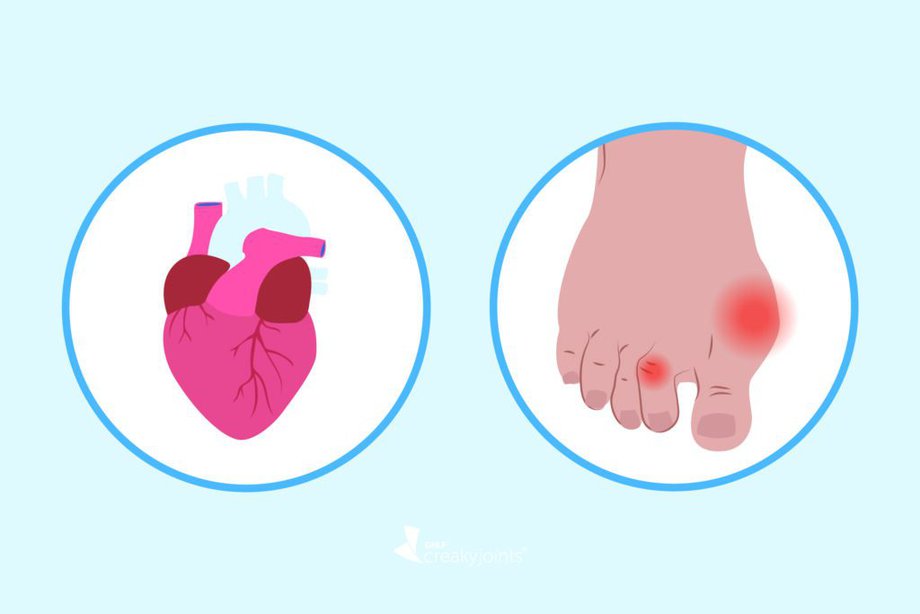Why Hypertension Is Related To Gout?

Hypertension, also known as high blood pressure, and gout are two prevalent health conditions that have been extensively studied and continue to pose significant challenges to public health.
While these conditions may appear distinct, there is a growing body of evidence suggesting a link between them. Understanding the underlying mechanisms behind this association is crucial for effective management and prevention strategies.
This article aims to explore the relationship between hypertension and gout, focusing on the role of uric acid, inflammation, oxidative stress, medications, and lifestyle factors. By examining the interplay between these factors, we can gain insights into how hypertension and gout may influence each other and potentially exacerbate health outcomes.
Furthermore, this article will discuss the potential complications that arise when managing these conditions concurrently and highlight the need for further research to enhance our understanding of this complex relationship.
Key Takeaways
- Hypertension and gout are related conditions that require a comprehensive approach for management.
- Lifestyle modifications and dietary restrictions, such as a low-purine diet, are crucial for managing both hypertension and gout.
- Regular physical activity, including aerobic exercises, strength training, and flexibility exercises, can help manage hypertension and gout.
- Treatment plans should focus on controlling blood pressure and reducing uric acid levels, and may include medications like diuretics, ACE inhibitors, and urate-lowering drugs.
Understanding Hypertension and Gout Individually
Hypertension and gout are both complex medical conditions that require a comprehensive understanding in order to explore their potential relationship.
Hypertension, commonly known as high blood pressure, is a condition characterized by elevated blood pressure levels. It is often linked to lifestyle factors such as diet, stress, and physical inactivity.
On the other hand, gout is a type of arthritis caused by the accumulation of uric acid crystals in the joints. It is influenced by a variety of factors including genetics, diet, and alcohol consumption.
The relationship between hypertension and gout is complex and multifactorial. Some studies suggest that hypertension may contribute to the development of gout through its impact on kidney function and uric acid metabolism. Additionally, certain medications used to treat hypertension, such as diuretics, can increase the risk of gout.
Understanding the role of diet and exploring appropriate treatment options are crucial in managing both conditions effectively.
The Link Between Hypertension and Gout
This paragraph will discuss the link between hypertension and gout, specifically focusing on shared risk factors and the impact on kidney function.
Both hypertension and gout share common risk factors such as obesity, high alcohol consumption, and a sedentary lifestyle, which contribute to the development of both conditions.
Additionally, hypertension and gout can both have detrimental effects on kidney function, potentially leading to renal damage and decreased renal function.
Shared risk factors contribute to the association between hypertension and gout. These shared risk factors include diet and nutrition, as well as genetic predisposition.
When it comes to diet and nutrition, both hypertension and gout are influenced by similar factors. High intake of purine-rich foods, such as red meat, seafood, and alcohol, can increase the risk of both conditions. Additionally, a diet high in sodium and low in potassium can contribute to the development of hypertension and gout.
Furthermore, genetic predisposition plays a role in the development of both hypertension and gout. Certain genetic variations can make individuals more susceptible to these conditions. For example, variations in genes related to uric acid metabolism can increase the risk of developing gout and hypertension.
By understanding and addressing these shared risk factors, healthcare professionals can better manage and prevent both hypertension and gout in affected individuals.
Impact on Kidney Function
The impact of the association between hypertension and gout on kidney function can be visualized as a delicate balance being disrupted, potentially leading to impaired renal function and increased risk of kidney damage.
Hypertension and gout share common risk factors such as obesity, diabetes, and metabolic syndrome, which contribute to their coexistence and the subsequent impact on kidney health.
Hypertension, characterized by high blood pressure, can lead to renal dysfunction through various mechanisms, including the narrowing of blood vessels in the kidneys and the deposition of uric acid crystals.
These mechanisms can impair the kidneys’ ability to filter waste products from the blood, resulting in kidney damage and the development of renal dysfunction.
Therefore, individuals with both hypertension and gout should be closely monitored for signs of kidney damage and renal dysfunction to prevent further complications.
The Role of Uric Acid
Uric acid plays a significant role in the relationship between hypertension and gout. Hypertension, or high blood pressure, often coexists with gout, a type of inflammatory arthritis caused by the deposition of urate crystals in joints. The connection between these two conditions lies in the role of uric acid in both. Uric acid is a waste product formed when purines, natural substances found in certain foods and produced by the body, are broken down. In individuals with gout, high levels of uric acid can lead to the formation of urate crystals, triggering painful gout attacks. Hypertension, on the other hand, can contribute to the development of gout by affecting kidney function and leading to increased uric acid levels.
To understand the interplay between hypertension, gout, and uric acid, it is essential to consider the role of diet and medication. Diet plays a crucial role in managing both conditions. Foods high in purines, such as organ meats, shellfish, and certain types of fish, can increase uric acid levels and should be limited in individuals with gout and hypertension. Medications, such as diuretics commonly used to treat hypertension, can also impact uric acid levels by increasing its production or reducing its excretion. Therefore, a comprehensive approach to managing hypertension and gout should include lifestyle modifications, dietary changes, and medication adjustments to optimize uric acid levels and reduce the risk of gout attacks.
| Role of Diet | Role of Medication |
|---|---|
| Limiting foods high in purines can help reduce uric acid levels | Some medications used to treat hypertension can impact uric acid levels |
| Avoiding organ meats, shellfish, and certain fish can be beneficial | Diuretics, commonly used to treat hypertension, may increase uric acid production |
| Consuming a balanced diet with a focus on fruits, vegetables, whole grains, and low-fat dairy products can help maintain healthy uric acid levels | Medication adjustments may be necessary to minimize the risk of gout attacks in individuals with hypertension |
Inflammation and Oxidative Stress
Inflammation and oxidative stress are important factors to consider in understanding the relationship between hypertension, gout, and uric acid. Elevated levels of uric acid have been linked to both hypertension and gout, and recent studies suggest that inflammation and oxidative stress play a crucial role in this association.
Inflammatory markers such as C-reactive protein and interleukin-6 have been found to be elevated in individuals with hypertension and gout. These markers indicate an increased level of inflammation in the body, which can contribute to the development of both conditions.
Additionally, oxidative stress, which occurs when there is an imbalance between the production of free radicals and the body’s ability to neutralize them, has been implicated in the pathogenesis of hypertension and gout.
Understanding the role of inflammation and oxidative stress in the relationship between hypertension and gout can potentially lead to the development of more effective treatment options for individuals with these conditions.
- Inflammatory markers:
- C-reactive protein
- Interleukin-6
- Treatment options:
- Anti-inflammatory medications
- Antioxidant supplements
Medications and Lifestyle Factors
Medications and lifestyle factors play a significant role in managing and potentially preventing the development of both hypertension and gout.
When it comes to hypertension, medications such as diuretics, beta-blockers, and angiotensin-converting enzyme inhibitors are commonly prescribed. However, certain medications used to treat hypertension can have an impact on gout.
For instance, diuretics can increase the levels of uric acid in the blood, which can trigger gout attacks.
Similarly, lifestyle factors such as dietary choices can affect both hypertension and gout. Individuals with hypertension are often advised to follow a low-sodium diet, which can also benefit individuals with gout. Moreover, consuming excessive amounts of alcohol and sugary beverages can increase the risk of both conditions.
Therefore, understanding medication interactions and adhering to dietary restrictions are crucial in managing and mitigating the risk of hypertension and gout.
Managing Hypertension and Gout Together
To effectively manage both hypertension and gout simultaneously, it is important to adopt a comprehensive approach that includes lifestyle modifications and adherence to dietary restrictions. Dietary modifications play a crucial role in managing both conditions. A low-purine diet is recommended for gout patients, as purines can raise uric acid levels in the body. This means reducing the consumption of foods such as organ meats, seafood, and alcohol. Additionally, a diet rich in fruits, vegetables, whole grains, and lean proteins can help control blood pressure. Exercise routines are also beneficial in managing both conditions. Regular physical activity can help lower blood pressure and maintain a healthy weight, reducing the risk of gout attacks. Incorporating aerobic exercises, strength training, and flexibility exercises into the routine can provide optimal benefits. By adopting these lifestyle modifications and adhering to dietary restrictions, individuals can effectively manage hypertension and gout together.
| Dietary Modifications | Exercise Routines |
|---|---|
| Reduce purine-rich foods such as organ meats and seafood | Incorporate aerobic exercises |
| Limit alcohol consumption | Include strength training |
| Consume fruits, vegetables, whole grains, and lean proteins | Practice flexibility exercises |
| Maintain a healthy weight |
Potential Complications
Managing hypertension and gout together can be challenging due to their interconnected nature. It is important to recognize the potential complications that may arise from this comorbidity. Understanding these complications can help healthcare professionals tailor treatment plans accordingly.
Current evidence suggests that the long-term effects of hypertension and gout can be detrimental to overall health. These effects include an increased risk of cardiovascular diseases such as heart attacks and strokes. Additionally, the combination of hypertension and gout can lead to kidney damage and impaired renal function.
To manage these complications effectively, treatment options should focus on controlling blood pressure and reducing uric acid levels. Lifestyle modifications, such as maintaining a healthy weight, following a low-sodium diet, and regular exercise, are crucial. Medications like diuretics, angiotensin-converting enzyme inhibitors, and urate-lowering drugs may also be prescribed to address both conditions simultaneously.
In summary, understanding the potential complications of hypertension and gout can guide healthcare professionals in developing comprehensive treatment plans that address long-term effects and offer suitable treatment options.
Conclusion and Future Research
In conclusion, further research is needed to explore the potential long-term effects and treatment options for individuals with hypertension and gout, in order to improve overall health outcomes and quality of life.
Future implications of this research could include a better understanding of the underlying mechanisms linking hypertension and gout, as well as the development of targeted interventions to prevent or manage both conditions simultaneously.
Additionally, further investigation is warranted to determine if effective management of hypertension could potentially reduce the risk or severity of gout attacks.
By identifying the specific factors that contribute to the relationship between hypertension and gout, healthcare professionals can develop more tailored treatment plans and interventions for patients with these comorbidities.
Ultimately, this research has the potential to significantly improve the health and well-being of individuals affected by both hypertension and gout.
Frequently Asked Questions
What are the symptoms of hypertension and gout?
Symptoms of hypertension include high blood pressure, headaches, dizziness, and chest pain. Gout symptoms include sudden and severe joint pain, swelling, redness, and tenderness. There is a known relationship between hypertension and gout, as hypertension can contribute to the development and worsening of gout.
How does hypertension affect the kidneys and lead to gout?
Hypertension, commonly known as high blood pressure, can lead to kidney damage. This kidney dysfunction can result in the accumulation of uric acid, leading to the development of gout, a painful form of arthritis.
Are there any natural remedies or alternative treatments for managing hypertension and gout?
Natural remedies and alternative treatments for managing hypertension and gout include lifestyle modifications such as regular exercise, maintaining a healthy weight, reducing sodium intake, increasing potassium intake, and consuming foods rich in omega-3 fatty acids.
Can gout medications worsen hypertension symptoms or interact negatively with hypertension medications?
Gout medications and hypertension medications may interact negatively or worsen symptoms. Precautions should be taken to avoid potential interactions. It is important to consult a healthcare professional for guidance on managing both conditions effectively.
Is there a specific diet or lifestyle changes that can help prevent or manage both hypertension and gout?
Specific diet and lifestyle changes can help prevent and manage both hypertension and gout. These changes may include reducing sodium intake, maintaining a healthy weight, limiting alcohol consumption, and following a diet rich in fruits, vegetables, whole grains, and low-fat dairy products.








